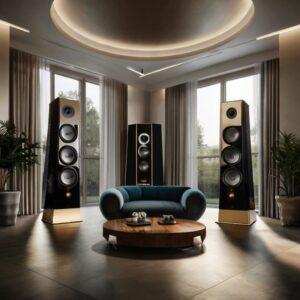Choosing the right speakers for classical music is essential for experiencing the rich nuances and intricacies of this genre. Unlike other forms of music, classical compositions demand a high level of fidelity and accuracy in reproduction to fully appreciate their complexity. In this guide, we’ll explore the factors to consider when selecting speakers tailored for classical music enthusiasts.
Read Also: 10 Best Speakers for Classical Music Listening At Home
Understanding Speaker Specifications
Before diving into speaker selection, it’s crucial to understand the technical specifications that define their performance. Parameters such as impedance, sensitivity, and frequency response play a significant role in determining how accurately a speaker can reproduce classical music.
Speakers for Classical Music
There are various types of speakers available, including floor-standing, bookshelf, and in-wall speakers. Each type has its advantages and is suited for different listening environments. For classical music enthusiasts, speakers with a balanced frequency response and good dispersion characteristics are preferred.
Budget Consideration
While high-quality speakers can significantly enhance the listening experience, budget constraints are a reality for many consumers. It’s essential to strike a balance between quality and cost, considering options that offer the best performance within your budget range.
Room Acoustics
The acoustics of your listening room can profoundly impact the sound quality. Factors such as room size, shape, and furnishings can affect how sound waves interact with the environment. Understanding these aspects and selecting speakers that complement your room’s acoustics is crucial for achieving optimal sound reproduction.

Brand Reputation
Reputable brands known for their commitment to audio excellence are often a safe bet when choosing speakers. Brands with a long history of producing high-quality audio equipment are more likely to deliver consistent performance and reliability.
Listening Tests
Nothing beats firsthand experience when evaluating speakers. It’s essential to audition multiple speakers in a similar price range to compare their sound quality and performance. Pay attention to details such as clarity, imaging, and soundstage when conducting listening tests.
Speaker Placement
Proper speaker placement is critical for maximizing sound quality. Factors such as distance from walls, height, and toe-in angle can significantly impact the listening experience. Experimenting with different placement configurations can help achieve the best results.
Maintenance and Longevity
Taking care of your speakers is essential to ensure they provide years of faithful service. Regular maintenance, such as dusting and inspection for any signs of wear, can prolong their lifespan and preserve sound quality.
Customer Reviews and Feedback
Utilizing customer reviews and feedback can provide valuable insights into the performance and reliability of speakers. Look for reviews from verified buyers and pay attention to common praise or complaints about specific models.
Accessories and Add-ons
In addition to speakers, consider investing in accessories such as speaker stands, cables, and room treatments to further enhance the listening experience. These add-ons can help optimize sound reproduction and create a more immersive listening environment.
Expert Recommendations
Seeking advice from audio professionals or fellow enthusiasts can provide valuable guidance when selecting speakers. Online forums, audiophile communities, and expert reviews can offer valuable insights and recommendations based on personal experiences.
Compatibility with Audio Equipment
Ensure that the speakers you choose are compatible with your existing audio equipment. Check for compatibility with amplifiers, receivers, and other components to avoid any compatibility issues or performance limitations.
Warranty and Support
Lastly, consider the warranty coverage and customer support offered by the manufacturer. Reliable warranty coverage and responsive customer support can provide peace of mind and assistance in the event of any issues or concerns.
Conclusion
Choosing the right speakers for classical music involves careful consideration of various factors, including technical specifications, room acoustics, budget constraints, and personal preferences. By understanding these factors and making informed decisions, you can enhance your listening experience and fully appreciate the beauty of classical music.
FAQs (Frequently Asked Questions)
- What type of speakers is best for classical music?
- While personal preference plays a role, speakers with a balanced frequency response and good imaging capabilities are ideal for classical music.
- Do I need to invest in expensive speakers for classical music?
- Not necessarily. Many affordable speaker options can deliver excellent performance for classical music enthusiasts.
- How important is room acoustics when choosing speakers?
- Room acoustics can significantly impact sound quality, so it’s essential to consider factors such as room size, shape, and furnishings when selecting speakers.
- Can I use bookshelf speakers for classical music?
- Yes, bookshelf speakers can be suitable for classical music, especially in smaller listening environments where space is limited.
- What should I look for when auditioning speakers?
- Pay attention to details such as clarity, imaging, soundstage, and overall tonal balance when auditioning speakers for classical music.




